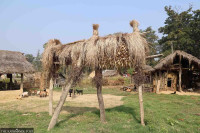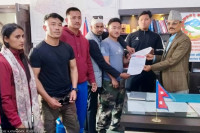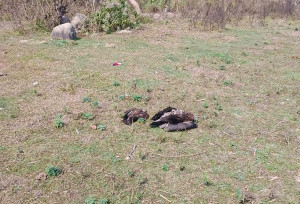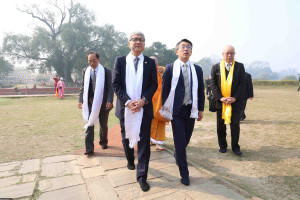Lumbini Province
Children with absent fathers struggle for citizenship
Officials say their hands are tied on provision for women to pass on citizenship to children when fathers are absent.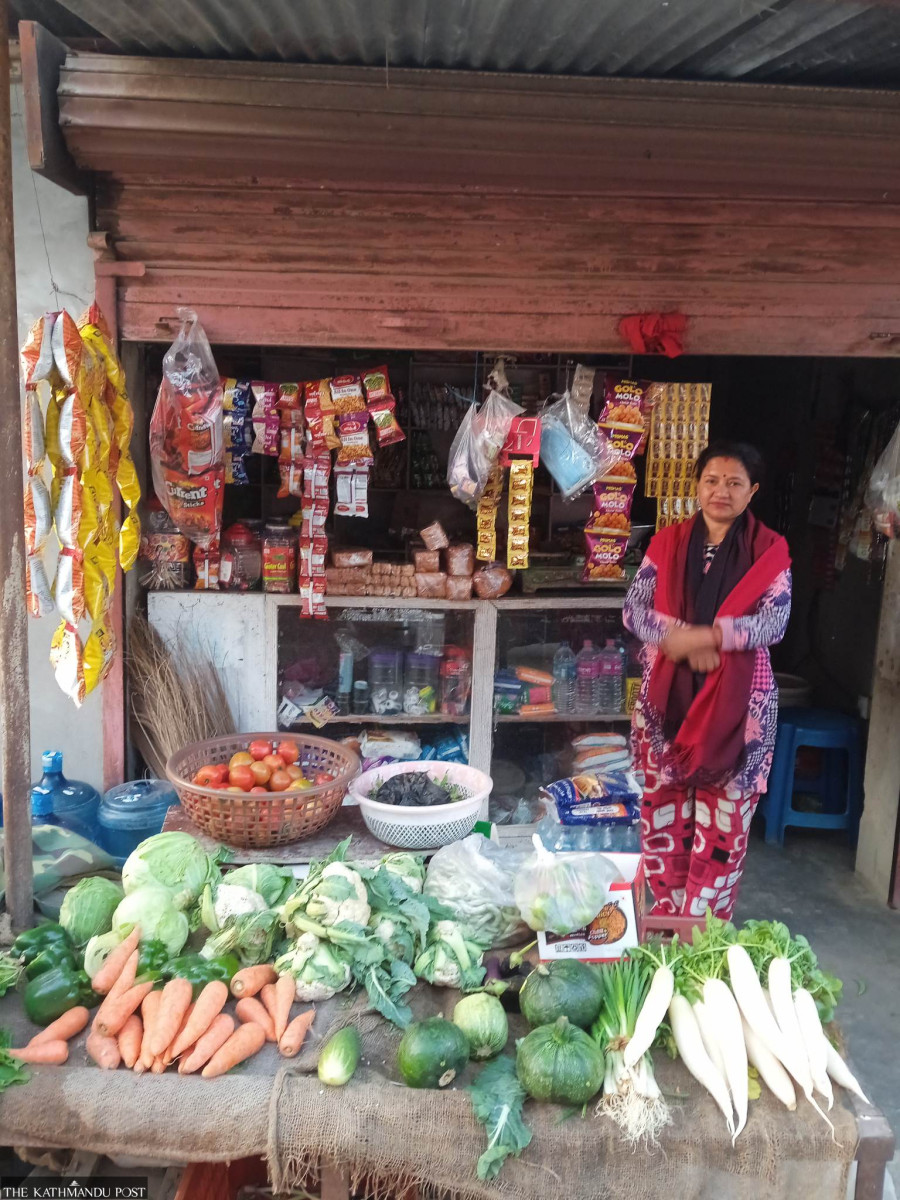
Rupa Gahatraj
Fifty-two-year old Kausalya Devi Budhathoki finds herself at a crossroads yet again. The challenges life has thrown at her have only gotten more difficult, she says. But never has she faced a greater challenge than trying to acquire citizenship for her two daughters with an absent father.
When she was a young woman, 23 years ago, she married a man against the wishes of her family and that of her husband’s. Budhathoki, originally from Nepalgunj, set out to start a new life in Kathmandu with her husband, Lal Bahadur Shah. She opened a small eatery in Thankot, on the outskirts of Kathmandu, while Shah worked as a contractor on construction sites.
The couple soon had a daughter.
As the daughter grew up, Shah became more distant, recalls Budhathoki.
Two years later, she moved to Surkhet as her business in Thankot was failing, and there, she gave birth to another daughter. She had expected the birth of a second child would keep her husband from wandering but that was not to be.
“We had been living in Surkhet for about a year when my older daughter started having health issues,” said Budhathoki. “She had fractured her hand when she was little and now the old wound was giving her trouble. The doctors in Surkhet suggested we take her to Nepalgunj for surgery.”
On the day of the surgery, her husband asked her to wait at the hospital in Nepalgunj while he made arrangements for money. “He left us there and went out,” Budhathoki said. “That was the last I saw of him. He never returned.”
After her daughter’s surgery for which she managed to pay for herself, Budhathoki went around looking for her husband. She called her husband’s friends, family and relatives in the hopes of knowing his whereabouts. Failing to locate him after multiple tries, Budhathoki gave up. She could not file a missing person’s report with the police since she did not have any supporting documents or his photograph to show to the police.
This incident happened 14 years ago. Since then, Budhathoki has been living in Nepalgunj with her daughters, who are now 21 and 19 years old.
“My older daughter, Swechchha, was seven years old and my younger daughter Shreya was four-and-a-half when their father left us,” said Budhathoki. “Since then I have been fighting a lonely battle to raise my daughters and to get them recognised as Nepali citizens in the eyes of the law.”
Swechchha, who is pursuing a BBS degree, is getting ready to step out into the world but the lack of her citizenship certificate has clipped her wings.
“I raised my daughters as a single mother. I hope for a good life for them, different from the one I had myself,” said Budhathoki. “But when the district administration officials in Banke sent us away asking us to return to the office with their father’s documents, I lost all hope.”
Budhathoki has not heard from her husband in more than 14 years and does not have any information on him to be able to track him.
It has been five years since her first visit to the District Administration Office trying to acquire citizenship for her daughters through her name. “I acquired my citizenship certificate about six years ago through my parents. My citizenship is based on descent which should qualify my daughters to acquire their citizenship.”
She has visited the District Administration Office and the district court several times but has been turned away every time.
Nepalgunj Sub-metropolitan City had written a recommendation letter to the District Administration Office for Budhathoki during her first visit to the office. But the officials there did not think much of the recommendation.
Budhathoki then went to the Banke District Court last year seeking citizenship status for her older daughter through her name. The court passed a verdict in her favour and directed the District Administration Office to issue Swechchha her citizenship.
But the District Administration Office did not implement the court order.
Budhathoki says she presented her documents to the District Administration Office, but was still refused.
Budhathoki owns a small vegetable shop in Nepalgunj. Both her daughters help her run the shop which allows the family to meet their growing expenses. Swechchha is eager to work and support the family, but she hasn’t been able to land a job for lack of a citizenship certificate.
She remembers very little of her absent father. He is but a name that she often forgets.
“I remember only glimpses of my father. My mother is the one who gave birth to us and raised us. I have seen her work very hard my whole life to put food on the table and pay for our education,” said Swechchha. “All I want to do now is take care of her. Give her some rest, but I can’t do anything until I have my citizenship certificate.”
Swechchha added, “Although the constitution guarantees that a child can acquire citizenship through their mother, the authorities are denying me my right.”
Article 11 (2) (b) of the Constitution of Nepal states that if a person whose father or mother was a citizen of Nepal at his or her birth, the offspring will get Nepali citizenship on the basis of any of their descendants when they reach the legal age.
Section 3 of the Nepali Citizenship Act, 2063, provides that when a person’s father or mother is a Nepali citizen, such a person will become a Nepali citizen by descent.
A single mother can pass on citizenship by descent to her child, provided the father’s identity is unknown.
The younger daughter, Shreya, who is about to finish high school, dreams of going abroad, but the lack of citizenship has compelled her to stay put.
“The administration always makes us feel that there is no value to my mother,” she said. “Our mother did everything for us, from protecting us to educating us. But in the eyes of the law of this country, she is a non-entity.”
Bishwajit Tiwari, a lawyer based in Nepalgunj, said that the constitution has the provision to grant citizenship to children in the mother’s name, but the decision has not come into effect. “The children whose father abandoned them or went missing face more difficulties than others,” he said.
According to the District Administration Office, although there is a provision for children to acquire citizenship through their mother in the Constitution of Nepal, the office cannot issue citizenship because laws and policies in this regard are yet to be formulated.
An amendment to the Citizenship Act 2006 has been deemed necessary to make it compatible with the constitution. However, due to differences among political parties, a planned amendment remains stalled since August 2018, when a bill to revise the Act was first registered in Parliament. As the then State Affairs Committee of the then House of Representatives couldn’t forge consensus among parties on the bill despite discussing it for over two years, the government on July 9, last year withdrew the bill and registered a new one, which was endorsed by the lower house on July 22 last year and subsequently by the upper house and was forwarded to the President.
The President, however, returned the bill requesting Parliament to revise some of the provisions. But Parliament again sent the bill back to the President without any revision and she sat on the bill and allowed it to lapse. The bill, however, did not address the issue of the status of children with single mothers and absent fathers.
When it comes to the provision for women to pass on citizenship by descent to their children in cases of absent fathers, the District Administration Office says its hands are tied. Budhathoki must be able to furnish proof of her children’s father being a Nepali citizen, according to Hari Prasad Sharma, assistant chief district officer and information officer for the District Administration Office, Banke.
“Citizenship issued by the nation for the identification of its citizens is important. Citizenship can be obtained by descent through the mother’s identity but the current law requires the applicant to furnish proof of the father’s identity as a Nepali,” said Sharma. “Therefore, it is necessary to address this issue in the new law. Until then, there is not much we can do about Budhathoki’s case.”
In the first week of February, Prime Minister Pushpa Kamal Dahal held a meeting with chief whips of all major parties wherein they all are said to have agreed to move forward important bills including the citizenship bill.
While seeking a vote of confidence on January 10 in Parliament, the prime minister had promised to endorse the citizenship bill within six months.
“The government must do what’s necessary for people like us who are cornered from all sides,” Budhathoki said. “The unequal citizenship laws do not allow for the transfer of citizenship to children through their mothers alone. But how long do my daughters have to wait before the government deems it the right time to address our issues?”




 9.89°C Kathmandu
9.89°C Kathmandu
